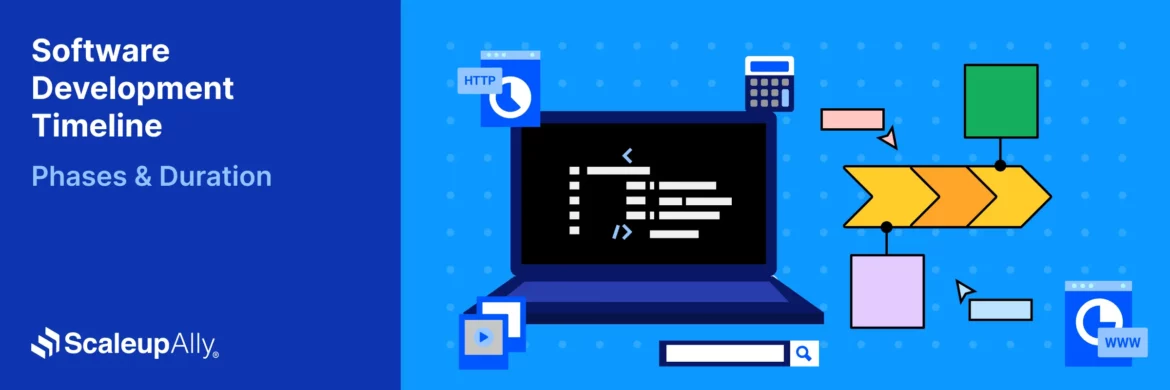
Enterprise Mobile App Development – Process, Types & Cost
Suprabhat Sen | January 31, 2024 , 11 min read
Table Of Content
Advancements in the global IT sector since the pandemic are driving the growth of both new and established businesses. There’s a growing demand for creating new products, especially high-performing solutions for businesses, which is leading industries to focus on long-term success as well as making money.
In this fast-moving industry, big companies want to use the latest technologies to find efficient solutions that will last a long time. Enterprise Mobile App Development is one way they’re doing this, especially now that it’s 2024 and remote work is common, unlike the time of the “great resignation.”
For big companies, there are many reasons to build these kinds of mobile apps, like growing in a sustainable way by using flexible resources. These apps also improve management and can make workflows more efficient.
So, let’s take a closer look at what these apps can do, how they’re used, the advantages they offer, and how they’re made, to understand why they’re becoming more important.
What is Enterprise Mobile App Development?
- What is Enterprise Mobile App Development?
- Why Build an Enterprise Mobile App?
- How much does it cost to develop an Enterprise Mobile App?
- Process for Building an Enterprise Mobile App
- Examples of Successful Enterprise Mobile Apps
- How Does ScaleupAlly Help You Build The Next-Gen Enterprise App?
- Conclusion
- Frequently Asked Questions
Enterprise Mobile App Development concerns creating a custom software solution to be exclusively utilized within a specific organization for its particular or diverse business needs. It bears multiple responsibilities, from optimizing the operational workflow to assisting employees in performing regular duties more efficiently.
Apart from its usefulness to employees, an enterprise mobile application also benefits management-level personnel and stakeholders.
By solving challenges via bridging gaps in cross-team functionality or collaboration, the enterprise app development solutions can grow company ROI by +35% and increase employee productivity whilst incorporating mobile app development technologies for cross-platform compatibility.
Of course, an enterprise mobile application may also be required to adhere to App Store and Play Store regulations if not distributed via organization FTP servers. Regardless of its mode of distribution, its development must also answer to legal, technical and useability requirements.
Overall, such solutions can increase collaborative communication by 47%, additionally facilitating an increase in satisfaction and loyalty.
Also Read: Top 11 Proven Benefits of Mobile App for Businesses and Startups
Types of Enterprise Mobile Apps
Depending on the organization’s requirements, enterprise mobile application development solutions mainly fulfill three types of purposes when classified by their hierarchical use case. Alternatively, they can also be classified into five types based on their singular-use utilities within an organization.
1. Enterprise Mobile Apps Types Based on Shared Hierarchy
-
Employee Clearance Enterprise Mobile Application
Example: Slack, Trello
Any enterprise mobile apps developed for employee use must cater to enabling quick and smooth communication and improved workflow management. It may happen that such apps have minimal features based on clearance level, but they could also offer project status tracking and management tools.
“Slack’s daily active 10 million users globally harness it to enjoy lightning-fast communication and widespread app integrations like with Trello, a project workflow management tool.”
-
Department-Use Enterprise Mobile Application
Example: Asana, Workday, Jira
Monitoring multiple teams and departments and tracking their progress, performance, and other KPIs require adequate utilities to streamline daily operations. Enterprise apps developed for this purpose focus on serving to multiply productivity across the board and organization.
“Asana brings intuitive cross-team project management and collaboration tools to the organization, with integration supported for JIRA – a must-have project and issue tracking tool for development teams globally.”
-
Organization Level Enterprise Mobile Application
Example: Office 365, Google Suite
It’s not a given that enterprise-level apps must be offline-based, and with cloud-based apps offering better scalability, they have become industry standard. Moreover, organization-level enterprise apps primarily cater to decision-makers whilst automating various operational processes and delivering on-demand, real-time analytics automatically.
“Office 365 as a package and the Google Suite comprises all essential tools for seamless operations among organizations with cross-platform support to offer collaboration opportunities with industry-grade data safety to promote sustainable productivity and ROI.”
| Note: Typically, most organizations build enterprise applications to incorporate all five types of utilities for shared use between the three hierarchical use cases within any business model. |
2. Enterprise Mobile Apps Types based on Singular Utility
-
Management-Oriented Enterprise Mobile App
Companies, namely Bosch and Nestle, are known for using Management-oriented enterprise apps like ERP software, HR management app, and business management apps. Together, these apps collectively solve the department-level challenges in retaining and promoting streamlined operations.
-
Cross-Team Collaboration Oriented Enterprise Mobile App
The use of a collaboration app made for enterprise use can surpass offering communication and incorporate CMS utilities. Although separately obtaining them is feasible, ensuring seamless integration is necessary to harmonize cross-team processes for developing content and storing or sharing it between teams.
-
Marketing Automation-Oriented Enterprise Mobile App
In 2024, most marketing apps for enterprise use exist or are developed to be cloud-based, supporting numerous application integrations. It is mainly to enable better accessibility when managing or launching marketing campaigns, sales funnel optimizations, leads investigation, etc.
-
Finance Management Oriented Enterprise Mobile App
Enterprise mobile app development solutions better manage the automation of laborious tasks concerning finances as they can keep error-free records, process invoices and payments, and support third-party payment gateway integrations to fulfil and monitor transactions.
-
Customer Solutions & Management Oriented Enterprise Mobile App
CRM systems in an enterprise mobile app offer extensive customer management solutions concerning call tracking and routing, customer service portals, and so on for creating and nurturing the best customer experiences for attaining satisfaction KPIs.
Why Build an Enterprise Mobile App?
An Enterprise Mobile app can be considered a life force for an organization or even for startups who use it. Its regular use, in various levels of accessibility and customizations, serves to complete all the needs for businesses to grow vertically, especially in competitive markets.
Stated below are the main reasons global organizations build and use enterprise mobile apps.
Establish Data Integrity & Security
Creating authentication and access controls and enabling data encryption helps to keep business data secure, confidential, and tamper-proof for ultimate safeguarding against leaks or errors.
Multiply Productivity
Accessing business information about processes, task completion, task delegation, and so on helps boost productivity, supports making informed decisions in a timely manner, and works for risk mitigation.
Enable Easy Communication
Smoother communication using an enterprise mobile app in 2024 for video conferencing and instant messaging magnifies collaborative outcomes and quicker deliverables.
Streamline All-Scale Operations
Reducing manual data entry or rectification based on automated processes and clockwork data management enhances workflow efficiency to increase the chances of achieving quarterly and annual goals.
Nurture Customer Experiences
Viewing and managing customer profiles and offering customer support in real-time with AI-driven self-assist features fosters positive customer interactions and engagements.
Long-term Scalability
Accurate resource allocation and business overview obtained from enterprise mobile applications can help stakeholders and management departments make decisions to implement cost-efficient strategies, collectively improving business scalability.
How much does it cost to develop an Enterprise Mobile App?
The cost of developing an enterprise mobile app can vary significantly based on several factors.
Firstly, the complexity of the app plays a role. Apps with basic features will be less expensive to develop compared to those with complex functionalities like real-time analytics or complex algorithms.
The average per hour cost to develop Enterprise mobile app solutions is stated below in respective countries/regions:
- USA & Canada – $50 to $250+ per hour
- UK & Australia – $40 to $175+ per hour
- Europe – $35 to $110+ per hour
- South America – $30 to $120+ per hour
- India & Asia – $25+ per hour
Process for Building an Enterprise Mobile App
The IT industry experts, per a Salesforce study, say it takes, on average, approximately three months to develop an application. Depending on complexities, involved tech stack, and other variables, this timeline can scale down or increase.
However, the process of building enterprise mobile applications follows an eight-step process.
-
Gathering Requirements & Research
Collecting expectations from employees and management to develop a solution with essential and additive features, functionalities, etc., requires deep research and brainstorming.
-
Assessing Technology & Infrastructure
Making existing back-end systems or legacy systems coexist and integrate with enterprise mobile app-developed solutions, including offering cloud-infrastructure support, is vital to decide. The latter aids in offering full control over accessing, managing, and configuring business resources.
-
Developing Enterprise Mobile Application Prototype
After due diligence and consideration of the project scope, developing MVP (minimum viable product) takes precedence. Hence, app developers and designers will collaborate to make initial wireframes for the prototype.
-
Preparing UI/UX Design
The general impression of an enterprise mobile application must meet the company’s objectives and vision while offering complete usability. Consequently, various test approaches will be implemented to arrive at solutions that offer the best user experience.
-
Full-Scale Development
At this stage, establishing the application components on the back end, like setting up a database, API functions, server connections, etc., will be performed. Herein, ensuring the product functionality matches the finalized assessment is critical for moving forward.
-
Quality Assurance & Control
Once the enterprise mobile application is complete, the QA teams will hunt any existing bugs and errors and test the perfectly working solution, overall useability, performance, and user-friendliness.
-
Turnaround or Deployment
After developing the final product in a flawless operational state, it will be deployed by uploading it to the App Store and Play Store or on FTP servers based on the geographical scale of the business’s operations.
-
Monitoring and Maintenance Updates
Modern technologies will constantly demand monitoring to keep them up to date with evolving newfound IT solutions and implementations. Likewise, any required maintenance updates must be provided in order to maintain and improve the outcome of all the involved steps above with respect to achieving business objectives.
Examples of Successful Enterprise Mobile Apps
By now, the post has discussed enterprise mobile applications at length. Still, learning the core essentials of such apps is important as their presence or lack can make or break their chances of success. Following the core essentials is the list of top-performing and widely adopted enterprise apps in 2024.
Core Essentials in Mobile App Development for Enterprise
- Resolute Security
- Flexible Scalability
- Wide Integrations Support
- Improve User Experience
- Analytics & Reporting
- Extensive Customizations
- Offline Accessibility
- Cross-Platform Accessibility
Six Popular Enterprise Mobile Apps in 2024
- Slack
- Trello
- Asana
- JIRA
- Microsoft 365
- Google Office Suite
How Does ScaleupAlly Help You Build The Next-Gen Enterprise App?
As a mobile app development company, ScaleupAlly is aware of the scale and bandwidth of enterprise-level operations from already developing mobile applications and web solutions with a focus on maximizing efficiency and increasing collaborative productivity. We can build the flexible enterprise mobile app development solution your business needs to grow its operations multi-fold while assigning access to tools offering real-time control and information management.
Connect with us to build mobile apps or to leverage our outsourced product development resources.
Conclusion
Into the 2030 decade, the emergence of machine learning-built artificial intelligence solutions will ascend the existing market-scale automation functionalities. To parallel the competition or get ahead of the curve, harnessing the skills of enterprise mobile application developers can offer your business the edge or the LTS solution it requires and deserves.
Frequently Asked Questions
Q: Which industries does the Enterprise Mobile App Development cater to?
A variety of global industries can benefit from enterprise mobile apps, from finance, manufacturing, healthcare, retail, and logistics, including other various-sized businesses among a wide spectrum of sub-sectors.
Q: Can Enterprise Mobile App Development build low-cost or no-code apps?
It is possible for Enterprise Mobile apps to utilize, incorporate or integrate with low-code or no-code developed solutions and platforms to deliver cost-effective and efficient business solutions.
Q: How do startups use Enterprise Mobile App Developed solutions?
Startups require daily operational efficiency and opportunities to improve customer engagement while building upon the scalability of its operations and management processes. By incorporating innovative technologies and enterprise mobile apps, startups can meet the specific primary business requirements to grow vertically.
Related Blogs

Top 20 Emerging Technologies of 2026
Discover the top 20 emerging technologies of 2026. Explore which innovations are driving change across healthcare, finance, manufacturing, and other crucial industries.
ScaleupAlly Team
Dec 16 ,
9 min read

Online Shopping App Development Cost in UAE | Pricing & Factors Explained
Understand UAE online shopping app development costs in 2025 with pricing ranges, influencing factors, hidden fees, timeframes, and expert savings tips.
Suprabhat Sen
Nov 29 ,
13 min read

Software Development Timeline: Phases, Duration & Estimation Guide
Understand the software development timeline with phase durations, key factors, hidden delays, and practical methods to estimate project time.
Suprabhat Sen
Nov 29 ,
16 min read



